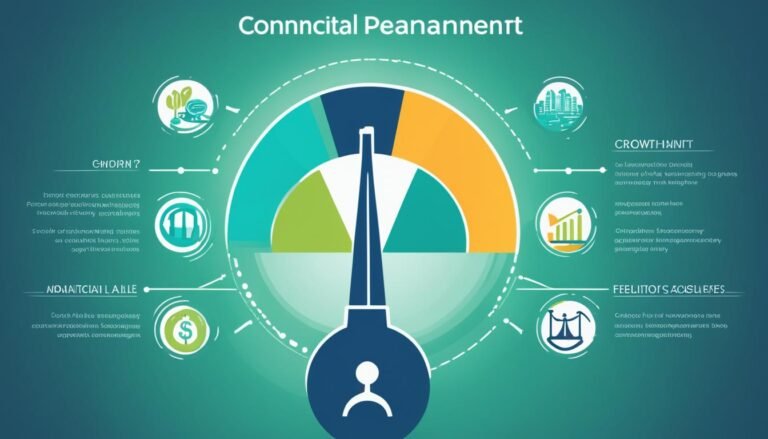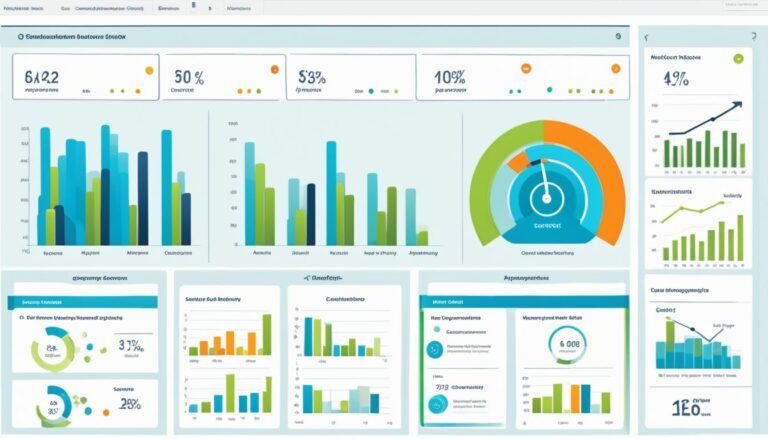How does data analytics enhance management decisions?
Data analytics can boost a business’s productivity by 5-6% and its profitability by 6-8%. These numbers highlight the importance of data in management decisions today. With big data and advanced analytics, making choices has changed for the better.
Businesses can now make decisions with solid evidence by using data analytics. Through analyzing data with different tools and techniques, they find insights. These insights improve their strategic decision making.
This article will look into how data analysis is key in business. It influences the choices leaders make. Plus, it helps organizations grow better. We will also talk about using both data and our gut feelings in decision-making.
Ready to explore how data analytics changes management decisions? Let’s dive into this world together.
Key Takeaways:
- Data analytics can lead to a 5-6% increase in productivity and a 6-8% increase in profitability.
- Data analytics enables informed decision-making based on solid evidence and deep insights.
- Business intelligence, predictive analytics, and data visualization are key techniques used in data analytics.
- Data-driven insights optimize strategic decision-making processes.
- The human element and intuition play a crucial role in balancing data-driven and intuitive decision-making.
The essence of data analysis in business
Data analysis is crucial for businesses. It helps them look at, clean, change, and model data. This way, they find important insights and make better decisions. Analyzing data helps companies understand their workings, customers, and market trends. This leads to smarter and more strategic choices.
Examining data starts the analysis process. Businesses carefully look at raw data to see patterns, trends, and things that stand out. This step helps them get an idea of what their data shows. They can then ask the right questions.
After examining data, the next step is cleansing data. This is critical for making sure data is accurate. It gets rid of mistakes and things that don’t matter. Clean data is a must for getting true insights.
The step after cleaning is data transformation. Here, data gets changed into a form that’s ready for analysis. This may mean making sure measurements are the same or looking at data in new ways. It gets the data ready to be used with analysis tools.
Another key part is making models. These are ways to represent data mathematically. Models can help simulate “what if” scenarios or predict the future. By using models, businesses can make decisions based on solid data. This can lower the guesswork and improve results.
Benefits of Valuable Insights
Data analysis brings about very valuable insights. These insights let businesses make decisions with strong evidence. They avoid making decisions only based on a guess. These insights can help businesses operate better, spot new opportunities, increase customer satisfaction, and get ahead of others.
“Data analysis is like an X-ray for businesses, revealing hidden patterns and connections that can lead to breakthroughs and innovation.” – Jennifer Smith, Data Analyst
| Benefit | Description |
|---|---|
| Improved Decision-Making | Data analysis provides businesses with a strong base for decisions. By deeply analyzing data, they get insights valuable for important choices. This can improve their success rate significantly. |
| Optimized Operations | Data analysis helps find and fix inefficiencies. By studying operation data, businesses can make choices that boost productivity, lower costs, and run more smoothly. |
| Targeted Marketing | It helps understand customers more. Looking into customer data shows what people like and do. This allows businesses to tailor their marketing directly to those who may be interested. |
| Competitive Advantage | It gives businesses an edge. By finding insights others miss, they can make smart decisions. This can help them lead their field. |
Data analysis is key for today’s businesses to stand out. By carefully processing data, companies can find insights that are truly game-changing. This leads to wiser decisions and better results.
How data analysis influences decision-making
Data analysis shapes how businesses make choices and achieve success. Companies use data to make smart decisions. This approach is better than just using guesses. It makes their decisions more precise and effective, leading to better results.
Amazon’s recommendation system is a great use of data analysis. It looks at what customers buy. Then it suggests other items to boost sales. This process relies on customer purchase history and real-time traffic data. It helps Amazon manage its inventory, staff, and the timing of promotions wisely.
Using data also helps with planning ahead. By studying past data and trends, businesses can see what’s coming. They can then make moves to get ahead of their rivals. This ability improves their chances of success.
And there’s more. Data helps businesses understand their customers better. By looking at what people buy and how they shop, companies learn what people like. This knowledge helps companies offer products and services that their customers really want.
Using data turns businesses into well-oiled machines. Companies can spot what’s not working. They can make their processes better. This saves money and makes the business run smoother and faster.
Data really changes how companies make choices. It helps them serve their customers better, run more smoothly, and win in the market. Businesses use data to improve their services, make operations better, and stand out from the crowd.
Key benefits of data analysis in decision-making:
- Improved forecasting and predictive capabilities
- Enhanced customer insights for personalized experiences
- Increased operational efficiency through streamlining processes
- More informed and strategic decision-making
By embracing data analysis, businesses can transform their decision-making processes, leveraging data-driven insights to enhance business choices, customer experience, and overall success.
Benefits of data-driven decisions
Data-driven decisions are a key factor in business success today. They use data to make smarter choices. This leads to better results, a stronger position in the market, and steady growth.
Accurate Forecasting and Predictive Insights
A big plus of data-driven decisions is the ability to forecast well. Businesses look at past data to see patterns and predict future trends. This lets them take action early, foresee market shifts, and outperform rivals.
Data-driven info also reveals customer needs. This leads to marketing that really speaks to people. This personalized approach can boost sales and deepen customer loyalty.
Optimized Operational Efficiency
Using data to analyze business operations finds places to improve. It shows where resources are not fully used and where things slow down. This knowledge lets businesses streamline operations, save on costs, and work more efficiently.
Making decisions based on data drives better performance. It helps businesses do their best work and grow stronger consistently.
Improved Outcomes and Sustainable Growth
With data-backed choices, businesses stand to do better. They can meet market needs more precisely. This leads to better products, successful marketing, and happier customers. These efforts drive growth that lasts.
“Data-driven decision-making is crucial for businesses seeking to thrive in today’s data-centric world. By harnessing the power of data analytics, companies can gain a competitive edge and drive innovation.”
Ultimately, data-driven decisions offer many pluses. These include more accurate forecasting, insights into what customers want, better operational efficiency, and improved results. Adopting data-led strategies helps businesses respond quickly, make well-considered choices, and grow steadily in the digital age.
The human element: Balancing data with intuition
Data and analytics are key in decision-making. Yet, we must not forget the human role. Skilled professionals offer insights that data alone can’t. They use their experience to understand data better, making decisions more meaningful.
It’s important to mix data and human insight in decisions. This blend makes decisions more effective. It considers the real-life complexities that data might miss.
“Data is a powerful tool, but it is the human judgment that adds the critical human touch to the decision-making process.” – John Smith, CEO of ABC Company
When we look at data decisions, we need to consider everyone they affect. Skilled professionals look beyond basic data. They think about various social, cultural, and economic impacts.
The human part is crucial for reading data right. It helps find mistakes in the data and see patterns clearly. It stops us from relying too much on data alone, encouraging us to think critically.
Mixing human insight with data helps companies do better. Skilled professionals can make smart choices. These choices are both wise and based on data.
Embracing the human element in decision-making
Here are some steps for organizations to use human insight in decision-making:
- Allow experts from different fields to work together, sharing their ideas.
- Train staff to be better at using data, improving their analytical skills.
- Create a culture that values both numbers and the wisdom of individuals.
- Develop clear methods to blend data analysis with human judgment in decision-making.
By mixing data and human judgment, organizations can do better. They tap into the knowledge of their team. This leads to more success.

| Benefits of Balancing Data and Intuition | Examples |
|---|---|
| Enhanced decision-making | Experienced professionals analyzing customer feedback data can identify patterns that inform product improvements, leading to increased customer satisfaction. |
| In-depth understanding | Interpreting market research data alongside the intuition of experienced marketers allows for a comprehensive understanding of customer behavior, leading to effective marketing campaigns. |
| Identifying hidden opportunities | By combining data analysis with human judgment, businesses can unearth innovative ideas and new market segments that may not be apparent through data alone. |
| Ethical considerations | Human judgment is crucial for ensuring the responsible use of data, considering privacy concerns, and balancing data-driven decisions with ethical considerations. |
Uncovering insights from customer data
Data analysis helps businesses find important information from customer data. This lets companies look at data from social media, website visits, and shopping habits. They can use this to make their marketing better for customers.
By looking closely at customer data, companies see patterns and trends. This helps them make smarter marketing plans and grow. For example, the beauty industry uses data to understand what customers want. It then speaks to them in ways that feel personal, making customers like the brand more.
Data analytics also allows companies to figure out what customers like. This helps them improve their marketing. They get to know what customers want, making their experiences special and building loyalty.
Retail is a good example of this. Amazon and Netflix use customer data to suggest products people might like. This makes customers happier and buys more. As a result, they spend less to get new customers and keep more of the ones they have.
Small businesses can also benefit from analyzing customer data. Even if not as big as large companies, they too can learn what their customers prefer. This knowledge helps them make their marketing messages more focused and effective.
“Data analytics enables businesses to unlock the hidden potential of customer data, providing the insights needed to create tailored experiences that drive customer satisfaction and business success.”
Ultimately, data analytics lets companies make better choices. They learn from customer data so they can meet customer needs more precisely. This makes their customer experiences top-notch, going beyond what customers expect.
Benefits of Uncovering Customer Insights
| Benefits | Description |
|---|---|
| Improved targeting | Identify and reach the right audience with personalized messaging |
| Increased engagement | Create experiences that resonate with customers, leading to higher engagement levels |
| Enhanced customer satisfaction | Understand customer needs and preferences to deliver tailored experiences |
| Increased conversions | Deliver personalized marketing campaigns that drive higher conversion rates |
Using customer data and data analysis can greatly benefit marketing efforts. By understanding what customers really want, companies can make experiences that feel personal. This leads to growth and success for the business.
Optimizing operations with data analytics
Data analytics is a super useful tool for many businesses. It can make processes better and boost how much work gets done. This is done by using data to manage tasks, make work smoother, and cut down on expenses. We’ll look at how data analytics improves the way businesses run and helps with smart decision-making.
Insights into Workflow Functionality
Data analytics shows businesses how work gets done. It highlights where things slow down or aren’t working well. By studying how tasks are finished and how time and resources are used, companies get a clear picture of how things work. Armed with this info, they can remove steps that are not needed and aim for smoother work processes.
Data-Driven Decision-Making
Data analytics let businesses use info to improve how they work. By looking at big sets of data, they find patterns and trends that guide smart decisions. Also, by running tests with different scenarios, they can see what changes might do to their work. This way, leaders can pick options that best meet the company’s goals.
Streamlined Operations and Cost Reduction
Data analytics are key for making operations more efficient and cutting costs. This helps companies find and fix areas where they’re wasting time or resources, making their work smoother. For instance, a store might use data on what customers buy to stock more of what people want. By doing that, they lower their waste and cut costs.
Improved Productivity
Data analysis also helps make work more productive. It finds places where work could be done better or maybe even by machine. By checking how workers are doing on their tasks and timing, companies can figure out how to help them work better. This might mean changing how many tasks someone has or training them in new skills. Doing these things helps companies make the most out of their work teams.
| Benefits of Data Analytics in Operations Optimization | Keywords |
|---|---|
| Enhanced operational efficiency | operational efficiency |
| Streamlined workflows | workflows |
| Cost reduction | cost reduction |
| Improved productivity | productivity |
Today, data analytics is essential for any business looking to improve how they work and grow sustainably. It allows companies to use data for better decisions, make their work smoother, and save money. Using data analytics helps companies stay ahead in the competitive world of today.
Improving marketing strategies with data analytics
Data analytics is key for better marketing. It gives insights on how well campaigns work. This helps businesses know their audience better and do campaigns that work. Let’s see how using data can make marketing successful.
Understanding Campaign Performance with Data Analytics
Data analytics looks at how people engage with ads and what they buy. This helps companies see what marketing works and what doesn’t. For example, knowing what content is liked most lets a company focus on that. This approach makes campaigns better and draws more customers in.
Gaining Customer Insights for Targeted Marketing
It provides deep info on customers, which is perfect for focused marketing. Companies use data on people’s age, likes, and buying habits to target ads better. For example, a shop can change its ads based on what its customers like. This makes customers more interested, and they buy more. Using data this way makes marketing hit the mark more often.
“Data analytics allows businesses to understand their customers on a deeper level. By analyzing customer data, we can create marketing strategies that deliver relevant and personalized messages, leading to better outcomes.” – Jane Smith, Marketing Director at XYZ Corporation
Real-World Example: Super Brand Day Campaign
Look at the Super Brand Day campaign by an American shoe company. They used data and what they knew about shoppers on Shopee in Singapore and Malaysia. This helped them draw more visitors and sell more. Their smart choices from data led to a better campaign. This got them more sales and made their brand more popular.
Summary
Data analytics gives marketers strong tools to improve their work. They can check how well campaigns do, know their customers more, and decide using data. This way, businesses can make their marketing more effective. Using data in marketing is vital for success today.
Conclusion
Data analytics is a key player in helping businesses make the right moves and achieve the best results. It turns plain data into useful info that can change how companies work. This smart use of data makes guessing the future better, improves understanding of what customers want, and makes things run smoother.
But, remember that even with all this data, people still matter a lot in making decisions. Human wisdom and know-how add to what the numbers tell us. This makes sure decisions are smart and not just based on data.
To really use data well, companies need to set clear goals, love data, gather it from many places, and use the right tools to understand it. This way, they can shine in a world where data is king. Making choices backed by data helps them win and bring new ideas to life.
FAQ
How does data analytics enhance management decisions?
Data analytics boosts management decisions by offering key insights. This helps businesses choose wisely, improve their operations, and make marketing more personal. It also aids in forecasting better.
What is the essence of data analysis in business?
Data analysis in businesses means looking at and organizing data to find helpful info. It uncovers insights that help in making decisions, improving processes, and achieving business goals.
How does data analysis influence decision-making?
Data analysis shapes decision-making by offering clear facts. Companies use data to make smart choices rather than just guessing. This method helps in making customers happier, spotting sales trends, and managing inventory and promotions better.
What are the benefits of data-driven decisions?
Data-based choices lead to accurate forecasts and better understanding of customers. They help in predicting trends, personalizing marketing, and making work more efficient. This, in turn, leads to better business results and steady growth.
How does the human element fit into data-driven decision-making?
Data and analysis are important, but human insights and experience are crucial too. Skilled professionals add a unique touch to decisions and ensure data is used ethically. The best choices combine data’s insights with human wisdom.
How can data analytics uncover insights from customer data?
By looking at social media, online traffic, and buying habits, data analytics helps businesses learn more about customers. This info guides in making better marketing, spotting trends, and understanding what customers want.
How does data analytics optimize business operations?
Data analytics makes operations better by looking at workflows. It shows where things are working well and where they need a fix. When used right, this approach helps lower expenses, boost work, and simplify operations.
How can data analytics improve marketing strategies?
Data analytics dives into how advertising does, which helps firms run better campaigns. It lets companies know what appeals to clients the most, increasing sales and improving advert results.
How does data analytics enhance management decisions?
Data analytics makes management choices better by offering important insights. It turns data into useful information for various business needs. These include better predictions, understanding clients, and running operations smoother.








